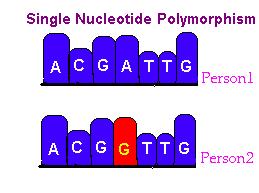|
Single Nucleotide Polymorphisms
What Are they?
A Single Nucleotide Polymorphisms or SNP (pronounced “snip”)
is a point mutation—a change of a single base—that is present in at least
1% of the population for a particular gene.

These variations are estimated to occur about once in every 600 base pairs,
for a total of around 5 million changes total. The majority of these
SNPs are completely harmless; they result simply in population diversity.
What Are They good for?
To put it simply—genetic markers. They’re useful in locating
genes on chromosomes, and in the kind of high-throughput genotyping of
populations needed for the study of complex traits, such as heritable diseases.
How useful are SNPs?
Well, Abbott Laboratories apparently feels they’re quite useful.
In 1997 they announced they will invest up to $44.5 million dollars in
the next two years in the genomics company, Genset. Genset, in return,
will create two sets of “bi-allelic markers”. Abbott Laboratories
will use one to construct genetic profiles of patients in a clinical trial
of one of their drugs. The other, broader one, is slated for marketing
to other drug companies for similar uses. (Marshall, “Snipping Away at
Genome Patenting”)

|
|


![]()